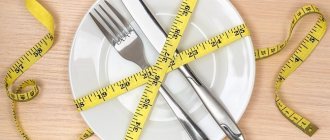Features of 36-hour dry fasting
Any fasting is aimed at giving up food. Thanks to this, the body uses fat as energy, starts regeneration processes, and begins to remove waste and toxins.
A feature of dry fasting is a complete refusal of water as well as food. The optimal period for performing this technique is 36 hours. All of these processes begin after 20 hours, from the moment the fast begins. It will take you 24 hours to achieve results. Huge benefits from the technique will appear with dry fasting for 36 hours.
What diseases does dry fasting treat?
Proponents of dry fasting note its healing properties in the fight against numerous diseases, such as:
- urticaria, psoriasis, eczema;
- bronchial asthma, tuberculosis, pneumonia and other diseases of an inflammatory nature;
- arthritis, rheumatism, osteochondrosis;
- obesity;
- neurosis, insomnia;
- ovarian cyst, benign tumors.
Dry fasting also normalizes blood sugar levels and reduces bad cholesterol, preventing the formation of plaques in blood vessels, which is why it can be useful for hypertensive patients. In addition, there is a theory about the potential benefits of a water-free diet for various oncologies.
Important! Dry fasting can only be used as an auxiliary method of treatment with the approval of the attending physician. To avoid serious harm to health, this method should never replace qualified medical care!
Harm and benefits of practice
Poor environment, constant stress, poor diet and negative emotions have a significant impact on human health. As a result of the modern pace of life, people develop chronic diseases. Fast food, excess sugar and salt in the body disrupt the intestinal microflora and contribute to weight gain. Fat accumulates in the body, also due to lack of physical activity. Dry fasting can help, and this is its great benefit.
During water refusal, the following processes are launched:
- A person experiences food arousal: he is irritated by the sight of food, its smell and conversations about it. Any mention of food causes profuse salivation, rumbling in the stomach and suction in the pit of the stomach. The person begins to sleep poorly, becomes irritable, and is in a bad mood.
- The process of intoxication of the body begins. The person may feel nauseous, may experience diarrhea, and frequent urination.
- At the end, the peak of intoxication occurs, when the maximum amount of waste and toxins leaves the body.
Not everyone can survive dry fasting. It is important to remember that spending a very long time without water is not recommended - serious problems with well-being may arise.
The benefits of dry fasting are as follows:
- The body is quickly cleansed. The processes described above occur in the body during any fasting, but when using the dry method they occur at maximum speed. Thanks to this, cleansing and healing of the body occurs quickly.
- Lightness and energy. Since the body is cleansed of toxins that take energy and contribute to a depressed state, when it is cleansed, energy is released and lightness appears.
- Lose weight, but don't expect huge results. Water and a small amount of fat will simply leave the body. The water will soon return and you will be back to almost your previous shape.
- Awakening the immune system. When we get sick, we take antibiotics and quickly return to normal. But this way we weaken the immune system, as a result of which it completely stops fighting infections. Dry fasting awakens the immune system and returns its ability to fight.
In addition to the benefits, fasting can also cause harm:
- If you have chronic diseases, then dry fasting may make them worse.
- Due to the rapid combustion of fat, particles are formed in the body that contribute to its acidification. This puts a lot of strain on the kidneys.
- If you have gallstones, you may have an attack.
Remember that during fasting, only you are responsible for the possible consequences. Don't joke with such a serious technique, otherwise you will face serious health problems.
Stages of dry fasting
You cannot suddenly leave your body without food and water; you must first familiarize yourself with the upcoming stages and prepare. Then you will have good results from a 36-hour fast. Preparation consists of the following steps:
- Entrance. Start preparing for the week: give up meat, as it can remain in the stomach for a long time and spoil the outcome of fasting, eat fruits and vegetables. Prepare yourself mentally. It is better to choose a day off to carry out the technique, since on a working day there is a high probability of failure due to accumulated fatigue. Do not drink alcoholic beverages, soda, or cigarettes, which increase hunger. On the eve of your chosen day, eat vegetables for dinner and eat nothing else. Proper preparation is half the success.
- Starvation. Do not eat during this day. Spend more time outdoors, do something to take your mind off the feeling of hunger. Try to remove from sight everything that could lead you astray. Every time you feel like breaking down, remind yourself of the benefits you will receive.
- Exit. During one day of dry fasting, your stomach will shrink in size. If you suddenly jump on food, you will start to have health problems. Therefore, you need to stick to a certain menu.
It is important to follow all steps, since any mistakes can lead to poor or no results.
ONE-DAY DRY FASTING, rules (36 hours)
Schedule of events at the Anna Yakuba School of Dry Fasting and Raw Food Diet “Dream”:
For questions regarding participation in the School’s programs, please contact Anna Yakuba: e-mail
RULES FOR CONDUCTING A ONE-DAY FASTING (36 hours) (chapter from Anna Yakuba’s book “The School of Healing Fasting and Raw Food Diet”).
CHAPTER 6. RULES FOR A ONE-DAY FASTING (36 hours).
The best day is today" Paul Bragg
Try fasting for one day and you will see that there is nothing more effective, safer and simpler than short periods of fasting. A one-day or 36-hour fast begins after the last water intake, continues throughout the next day and ends with the next day's water intake. For example, if you choose Friday as your fasting day, your last drink of water will be on Thursday evening, and your first drink after fasting will be on Saturday morning. That is, when I say “one-day fast,” I mean overnight + day + night, a total of 36 hours. This type of fasting is ideal to do regularly every week.
Short-term regular one-day fasting once a week and 3-day fasting once a month enhance the body’s ability to self-heal, maximally stimulate mental processes and contribute to the disclosure of spiritual potential. Even the ancients said: “Eat for six days, fast for one day.”
The correct and competent practice of fasting can radically change your spiritual life, physiological health and mental activity. I invite you to make fasting an integral part of your life, a regular procedure for caring for your spirit, mind and body, and I want to give competent, practical recommendations, repeatedly tested on yourself.
Here are some tips for successfully doing a one-day dry fast.
During the one-day abstinence from food and water, you can go about your normal activities - go to work and do everything you do every day. If you decide to fast on your day off, then it is advisable not to lie in bed or in front of the TV. Walking and light running in the fresh air, physical and mental activity, within moderate limits, will make the fasting process more effective and enjoyable.
The rhythm of life of a modern person is constantly accelerating, and the media have a huge influence on our consciousness. We have to maintain numerous social connections and perform many tasks that scatter our attention and steal our time. It is best to make your fasting day your solitude day. This is a great opportunity to devote the whole day only to yourself, your thoughts, dreams and, of course, caring for your body. A one-day fast is your opportunity to step away from routine tasks and obligations, especially those that need to replenish the refrigerator. But you can spend more time thinking, praying or meditating.
Many of us would like to make time for spiritual improvement, but the reality is that spiritual goals often end up at the bottom of our to-do list. We justify this by saying that we do not have the time and suitable conditions for this. Other issues turn out to be more urgent and pressing. Short-term fasting, spent in solitude, creates the necessary conditions for strengthening the spirit and increasing concentration. If you have a goal of spiritual improvement, you can devote more time to prayer, philosophical reflection or meditation in your daily routine.
I encourage you to write down your thoughts, ideas, goals, and accomplishments in a journal. You can develop your own course of spiritual and physical improvement for a year, five years and beyond. This will help you achieve greater results and expand your understanding of your path. A calm and quiet day, during which you take care of your soul and body, take care of yourself and your inner self, will give you long-lasting and lasting feelings of relaxation and renewal.
Try to organize your planned day in such a way that you are distracted as little as possible by phone calls or unexpected guests (ask in advance not to be disturbed by calls, visits, or simply turn off your mobile phone). A few leisurely walks in a park or forest will be extremely beneficial.
The advantage of fasting at home is that you set your own rules, create your own daily routine, and decide for yourself what is important to you. You can use the sample below as a basis, but first promise yourself that you will strictly adhere to what you planned. This kind of internal commitment will discipline you and help you achieve the greatest success in your future fasting practice.
Since this fast does not last long, there is no need to follow a “transition” diet before and after it for several days. During a 36-hour abstinence, in order to ensure an easy transition of your body from one state to another, it is enough to adhere to a diet of plant-based foods (raw food) in the days preceding and following the fast. To make it easier to endure fasting and get the maximum effect, eat in moderation and limit yourself to a small amount of food.
Ideally, you should have lunch no later than 15:00, and drink water for the last time at 18:00. It would be nice to take a walk in the fresh air (it would be better with a good friend). If at this time you usually watch TV and at the same time have a snack, it is better not to turn on the TV at all! Try to go to bed early, and if you can't fall asleep, read a good book or do anything else that usually helps you fall asleep.
Here are some more practical tips and a sample daily schedule.
On the eve of fasting, eat only fresh, raw vegetables and fruits. If possible, drink plenty of fresh juices or green smoothies. What needs to be done the day before?
1. Buy fresh fruits and vegetables for the day after fasting. It is advisable that these are local products grown in this season. Don't forget to buy a lemon.
2. If you don’t have a filter for water purification at home, stock up on clean filtered water.
3. Do not transmit, eat only light foods and limit your consumption of foods containing animal proteins (meat, fish, dairy products). It would be nice to be on a raw food diet on this day and drink freshly squeezed juices.
4. For lunch, eat only fresh raw vegetables or fruits.
5. For dinner, limit yourself to fruits only, excluding bananas and grapes. But it’s better to do without them by drinking water, freshly squeezed juice or a green smoothie.
6. At 18:00 - 21:00 you drink water and after that you don’t drink or eat anything for 36 hours.
Man is prone to give in to temptation, and the two biggest temptations during a fast occur when he sees or smells food. Therefore, on the day of fasting, try not to turn on the TV with almost continuous food advertising and not to be present during its preparation. Thoughts about water and food may haunt you throughout the day. However, if you focus on your goal and try to strictly stick to the routine you created, you will feel great. Remind yourself that your abstinence will only last for one day. But during this day you can do so many useful things for your spirit, body and mind.
Get up in the morning at your usual time, start your business and continue doing it as usual. Stay focused, focus your attention on work or whatever activity you are currently doing. It’s good to do gymnastics (breathing, stretching or any other).
Sample schedule for a fasting day
- 06.00 - gymnastics in bed.
- 06.15 - morning rule (prayer or meditation)
- 07.00 - morning walk or light jog
- 08.00 – shower
- 08.20 – breathing exercises
- 09.00 - relaxing music, prayer or meditation
- 10.00 - reading, working on the computer
- 12.00 - walk in the fresh air
- 14.00 - music, rest or sleep
- 15.00 — stretching gymnastics
- 16.00 - reading, working on the computer or watching your favorite movie
- 18.00 - walk in the fresh air
- 20.00 - diary (how the day went)
- 20.30 - prayer or meditation
- 21.00 - reading
- 22.00 - sleep
If you are at work, then at lunchtime it is better to go for a walk in the fresh air so as not to be tempted by conversations, the sight and smells of food. You may be filled with energy, but partly - negative (euphoria or irritability may appear). A walk will help you warm up and relieve nervous tension. Try not to tell anyone about your fasting, so as not to cause critical manifestations (misunderstanding, ridicule, persuasion, etc.).
When you get home, it’s good to do some household chores (but not cooking - you need to do this in advance for your loved ones). Do some housework, put your papers in order, put your desk and cabinets in order. Do gymnastics (breathing, stretching or any other). It’s better not to watch TV, but to read a good book, knit, play chess, etc.
As bedtime approaches, you may experience some emotional hunger, but it is advisable to let the feeling of impending triumph overcome it. If you're so embarrassed by thoughts about food that you're ready to stop right now, don't do it! Night time is the worst time to eat, and if you eat enough, you will negate everything that you have achieved today with such difficulty. Wait for the morning, which will come very soon. There are a few hours left before breakfast.
If you're on the verge of a breakdown, keep yourself busy. Go for a walk, taking your other half, a friend, a child or a four-legged friend with you. Research publications on the Internet about some topic that is relevant and interesting to you, for which you have not had time before. Draw your self-portrait. It may not be a masterpiece, but it will entertain you. Finally, you can clean the pots or finally organize the cabinets (just kidding!).
When you finish your usual activities, don’t forget to praise yourself for your perseverance, and then go to bed. If you can't sleep because you're hungry or have too much energy, go back to reading a good book, doing a crossword puzzle, or doing something that usually helps you relax (prayer, meditation, soft music, audiobooks, etc.).
People's reactions to the processes occurring in the body during fasting are different. You may feel tired, have a headache, or have other symptoms. You shouldn't be afraid of this. This all happens because your body is doing the work of clearing away accumulated waste, toxins and other unpleasant accumulations. Over time, all these symptoms will disappear and this day will pass easily and unnoticed for you. Or rather, on the contrary, you will notice that on this day you have much more free time, because previously at least 2-3 hours were spent on preparing and eating food.
In your journal, write about your day. Was it easier than you expected? What stimulated you the most? How did you feel before this? How do you feel now? Did you feel weak? Has your mood improved? Was there a surge of strength? Or was it really difficult? Would you like to do this again? What are your plans for the future? Write down everything that you consider important and necessary. This will definitely come in handy in the future.
The next day after fasting, drink a glass of water in the morning and 15 minutes later, a freshly squeezed juice or green smoothie. For breakfast, it would be good to eat a “broom” salad made from fresh cabbage and grated carrots. It’s good if you can eat only fresh vegetables and fruits on this day, excluding from your diet not only animal products, but also thermally processed foods.
The next day, get up at your usual time, clean your tongue, remove plaque from it and drink, slowly, a glass of clean, cool water. Afterwards, take a warm shower, which will help you relieve tension and enjoy yourself.
For breakfast, it is best to drink a green smoothie. Eat and drink slowly, with concentration, chewing your food thoroughly. Don't forget to congratulate yourself on a successful fast and reward yourself! You can have your favorite fruit, or something else that is not related to food, but feeds your soul. The subsequent diet should also consist of raw fruits and vegetables (raw food diet).
And then continue with your day. It will definitely be wonderful!
Want to truly change your life? Do you want your dreams to start coming true? Do you want to maintain youth, health and high creative potential for many years? Then this book is for you !!!
Buy the book in electronic form: https://syhoegolodanie.com/magazin/elektronnaya-kniga-put-k-zdorovoi-i-schastlivoi-zhizni Review of the book: Prokhorov Eduard (Russia, Novorossiysk) Anna, hello! Yesterday I received 50 copies. your book. I have already read one, it’s a pity that they are all the same))). The book is wonderful! Today I will begin to spread it among my colleagues and acquaintances (for free, of course), because the feelings that I received at your School are very valuable to me, I don’t want to trade them - I want to give them to good people! To be honest, I relaxed during Maslenitsa: I ate and drank. I read your book and perked up again. I’m sitting on a strict post, yesterday I went into famine, I’m planning for three days. Thank you for your help in organizing the receipt of books; if there are not enough, I will order more. Good luck and achievements to you!
Website of the Anna Yakuba School of Dry Fasting and Raw Food Diet “Dream”: www.syhoegolodanie.com Events of the School of Dry Fasting and Raw Food Diet “Dream”: Reviews from participants in our programs: Youtube channel of the School of Dry Fasting and Raw Food Diet “Dream”: www.youtube.com/c /AnnaYakuba For questions regarding participation in the School’s programs, please contact Anna Yakuba: e-mail
Menu for breaking fasting
Since you need to be careful when returning to a normal diet, it is better to follow the following menu for one day:
- For breakfast, drink freshly squeezed juice diluted with warm water. You can also make smoothies using water.
- For lunch, eat porridge. Cook it without adding salt, sugar or spices.
- Drink juice or smoothie again as a snack.
- For dinner, prepare a light vegetable salad dressed with olive oil.
By following this menu, you will not harm your body. Also remember to drink water, but don't overdo it so as not to put a strain on your kidneys.
Stages of implementation
After the doctor confirms that the procedure is possible, you need to psychologically prepare yourself to strictly adhere to food abstinence.
We recommend reading
- Structured food refusal according to the Shelton system
- Difference between dry and wet fasting
- Advantages and disadvantages of cleansing by Porfiry Ivanov
Entrance
A week before the chosen date, you need to prepare for a stressful situation by eating vegetables and fruits. Avoid meat completely; it takes a long time to digest and can remain in the stomach for a long time, spoiling the result. Gather your willpower and control random snacks on the run.
Read also: Can there be a temperature due to intestinal dysbiosis and how to get rid of it
Tune in to healthy eating in small portions. For the first time, fasting against the background of physical and mental stress is strictly prohibited; set a fasting day for the weekend. Avoid alcohol, nicotine, spicy foods, and carbonated drinks. They increase the feeling of hunger. The day before, you should have a light dinner with vegetables, then refrain from consuming food. With proper preparation, going thirty-six hours without food or water is an achievable goal.
Hunger
On the day of cleansing, it is better to plan a leisurely walk in a park or forest. Take up a hobby that will take your mind off food for a long time. Staying in an apartment near the refrigerator all day can provoke rash actions. Failure is undesirable, concentrate on the main goal. Mentally imagine how much benefit your body will receive by cleansing itself of harmful substances.
What information is missing from the article?
- Real reviews about the practice
- Experts' opinions
- Photo and video reviews
- More menu options for preparation and exit
Exit
To consolidate the result, you need to go out, following the recommendations of experts. The stomach has significantly decreased in size; you cannot overload it by immediately attacking food. Follow the following menu:
- For breakfast you should drink freshly squeezed juices diluted with boiled water to remove high concentrations of acidity. For diseases of the gastrointestinal tract, juices are replaced with oat infusion.
- For lunch, prepare cereal porridge without adding salt and sugar.
- Fortified juices are also drunk during the afternoon snack.
- For dinner, you should eat a vegetable salad dressed with olive oil.
In between, be sure to drink a small amount of water to replenish the loss and avoid dehydration.
Contraindications
If you have certain diseases, you cannot fast. Remember that this can have negative consequences. Among the contraindications are the following:
- pregnancy;
- breast-feeding;
- malignant neoplasms;
- blood poisoning;
- diabetes;
- liver or kidney problems;
- hepatitis;
- epilepsy;
- schizophrenia;
- encephalitis;
- tuberculosis.
If your doctor has prescribed a therapeutic diet for you, then stick to it, as deviating from the menu can end badly. Especially when using dry equipment.
If you have some chronic diseases, you can fast, but only if you have first consulted with a doctor or will do it under his supervision.
Intoxication process
During fasting, the work of certain cells and components is activated, such as:
- catecholamines – develop in the adrenal glands and are responsible for maintaining homeostasis and the body’s response to stress;
- protein is the main component necessary for building muscles;
- histamine – responsible for allergic reactions;
- leukocytes are white blood cells responsible for protecting the body.
Thanks to the activation of these substances, the body is cleansed and restored faster. All viruses and fungi leave the body along with urine.
Since the body cleanses itself through the excretory channel, do not be surprised by the frequent urge to go to the toilet - this is a normal reaction of your body.
Does dry fasting help you lose weight?
Answer: no. In 36 hours, the body will drain the water and break down a small amount of fat. If you see a lower number on the scale after fasting, then this means only one thing - water has left the body. But you cannot stop drinking and fasting constantly and the water will return. Your weight won't change at all, so fasting is a bad technique if your goal is to lose weight.
Prolonged fasting promotes weight loss, but only because the body is depleted and uses fat as fuel. But then you will also return to your normal diet, that is, you will gain your weight back. If you want to cleanse yourself of waste and toxins and at the same time lose weight, then use fasting, but then eat right so that the weight does not come back.
If you want to lose weight, then eat healthy with a calorie deficit and exercise. Only this method will help you lose weight and maintain a beautiful shape.
Possible difficulties
During the fasting process, you may encounter various difficulties, for example:
- Misunderstanding of loved ones. Our society is structured in such a way that any person who lives differently from others is immediately set on the true path. Therefore, you will hear comments such as “why do you need this”, “don’t do nonsense”, “don’t torture your body” and the like. There is no point in proving anything to such people, so continue doing what you want and don’t pay attention to them. If your parents are against this, then explain that this is a necessary experience, and then you will return to normal life.
- Bad feeling. If you feel unwell on the day of fasting, stop the experiment immediately. If it doesn't get better after this, call a doctor.
- Irresistible desire to drink. If you did everything correctly, then everything will go fine. Remember that 36 hours includes night-day-night. If you fast according to the day-night-day principle, the result will be 48 hours. If it is difficult to restrain yourself, reduce the time to 24 hours.
- Nausea, dizziness, vomiting. Small signs of these symptoms sometimes appear, but if they are very strong, then stop the experiment.
- If, after completing the fast, your stomach begins to hurt, problems with the gastrointestinal tract begin. Remember whether you went through all the steps correctly, especially the exit, to understand what the reason is. Make an appointment with a gastroenterologist to start treatment on time.
Dry fasting is a good way to cleanse the body, provided you do it right. There are different versions of this technique: for 24 hours, for 36 and for several days. But it is worth remembering that a person cannot live for a long time without water. Some people extend the dry fast to 5-7 days, but the recommended amount is 3 days maximum. The 24-hour fast is suitable for complete beginners. 36-hour is optimal, as it does not require long restrictions and does not put much strain on the body.
Losing weight by fasting is a bad option. Especially in the case of the dry method. Such techniques are good for cleansing the body of toxins and waste, but not for losing weight.
Please remember that you are responsible for using this technique. The results are impossible to predict: some people gain energy and their body heals, while others experience health problems and deterioration of their condition. Try to fast when there is someone at home, so that if you feel unwell, someone can take care of you and call a doctor for you. Especially if there are chronic diseases and contraindications.
Changes in the body over 36 hours
On the one hand, giving up food and liquid is more difficult than giving up food alone. However, many practitioners note that 36-hour dry fasting is much easier to tolerate than classical fasting. This is due to the following factors:
- Psychology. If the patient is allowed to drink water, he strives to consume it as often as possible in order to drown out the feeling of hunger. However, the restriction of fluid puts him in a framework of indifference and makes him think less about what is forbidden or allowed to him.
- Suspension of digestive processes. When drinking water, the stomach and gastrointestinal tract, as well as the genitourinary system, do not stop working, so digestive juices are produced. And this, in turn, increases the feeling of hunger several times.
- Short time. Some practitioners endure fasting for 40-50 days or even more, which allows them to achieve results. Dry fasting does not require such periods, which means it is much easier to tolerate.
In addition, if the goal of dry fasting for 36 hours is weight loss, the patient achieves results much faster, which helps him not to break down. Meanwhile, over this period of time the following changes occur:
- Deterioration of mood. A person experiences irritation, and the body requires water and food. The digestive system is still in a state of activity, so psychological and physiological hunger may increase significantly.
- Intoxication. Unpleasant symptoms such as nausea and increased urination may begin after 20 hours, but then quickly decrease and the person feels better. All this is usually accompanied by weakness. However, negative symptoms appear only in some cases.
- Energy production. A person’s body temperature rises according to his own sensations, but the thermometer usually shows about 37 degrees. Many practitioners feel hot and become active due to the released energy. The intoxication process is completed.
During the entire 36-hour fast, the patient manages to use up to three liters of endogenous water for the body’s needs and lose up to five kilograms of excess weight (indicators depend on individual characteristics and initial body weight).
At the same time, many note the elimination of certain inflammatory processes, acne, improvement in well-being due to the relief of acute and chronic diseases, and a general increase in vital energy. Dry hunger allows a person to quickly and easily switch to a healthy diet and “cleanse” the taste buds, making them work better.
Be sure to read: Secrets of effective weight loss while sleeping. How many calories can the body burn?










